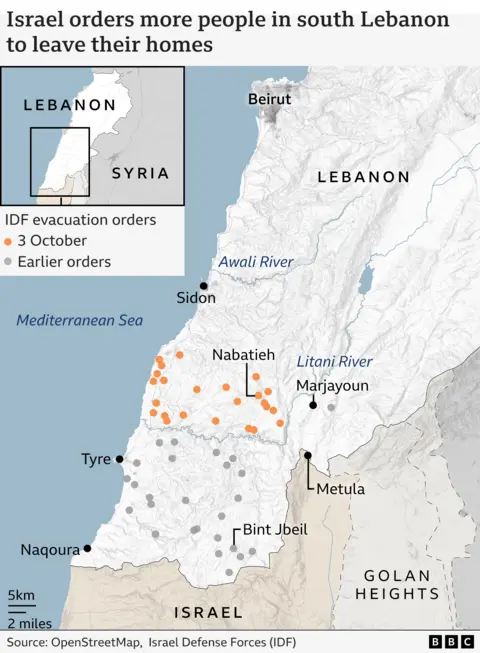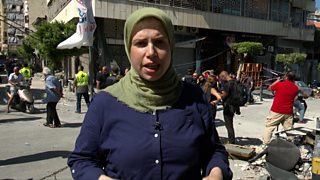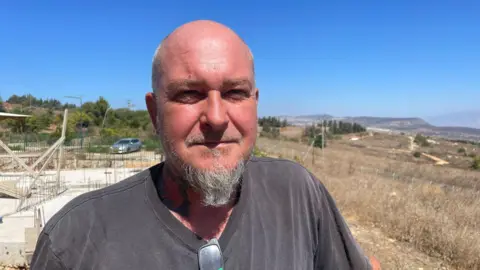
Massive blasts in Beirut after renewed Israeli air strikes
- Published By Jane Njeri For The Statesman Digital
- 1 year ago
Apparent Israeli bombing caused large explosions just outside Beirut's international airport during a further night of air strikes targeting Hezbollah in the city.
The target is unclear but the airport borders Dahieh - Hezbollah's stronghold in the capital. Plumes of smoke could be seen over the city as dawn broke on Friday.
Elsewhere, the Lebanese army said two of its soldiers had been killed in the country's south as Israeli forces pressed on with their invasion against Hezbollah and ordered another 20 towns and villages to evacuate.
The Israeli military has not commented, but did say its troops had killed Hezbollah fighters near the border. Hezbollah said it had targeted Israeli troops on both sides of the frontier.
The two fatal attacks on the Lebanese army soldiers were just hours apart on Thursday, the third full day of the invasion.
In the first incident, the army said, one soldier was killed and another was wounded “as a result of an aggression by the Israeli enemy during an evacuation and rescue operation with the Lebanese Red Cross in Taybeh village".
The Red Cross said four of its volunteers were also lightly wounded, and that their movements had been co-ordinated with UN peacekeepers.
The army said that in the second incident another soldier was killed “after the Israeli enemy targeted an army post in the Bint Jbeil area”.
“The personnel at the post responded to the sources of fire,” the Lebanese army added, marking a rare involvement in a conflict in which it has not engaged.

The news came as the Israel Defense Forces (IDF) told residents of another two dozen towns and villages in the south, including the regional capital of Nabatieh, to leave immediately for their own safety.
Unlike the communities ordered to evacuate on Tuesday, they are all located north of the Litani river, which lies about 30km (18 miles) from the border.
Before the invasion, Israel had demanded that Hezbollah’s withdraw to the Litani, in accordance with a UN Security Council resolution that ended their last war in 2006.
Speaking to the BBC from Beirut, the World Food Programme's country director in Lebanon, Matthew Hollingworth, described the situation there as “horrific”.
“There is black smoke billowing over the southern suburbs and we see it each morning when we come to work and we see it all day long. And there's a striking number of people who are displaced around the city.”
“There are these cars everywhere that are from people that have fled the fighting in the south of the country and the southern suburbs. There's traffic everywhere, people sleeping outside.”
Juan Gabriel Wells, Lebanon country director with the International Rescue Committee, said nearly half of displaced people surveyed by his organisation in shelters run by the government were children under the age of 15.

Israel's latest air strikes on Beirut come 24 hours after a residential building in the centre of the capital was hit. A civil defence agency linked to Hezbollah also said seven of its first responders were among nine people killed in the strike.
Lebanon’s health minister later said more than 40 paramedics and firefighters had been killed by Israeli fire in the past three days.
The Israeli Air Force carried out air strikes during Thursday against targets it said belonged to Hezbollah including the group's intelligence headquarters, weapons production sites, weapons storage facilities.
Two weeks of Israeli strikes and other attacks targeting Hezbollah have killed more than 1,300 people across Lebanon and displaced more than one million, according to local authorities.
Israel went on the offensive after almost a year of cross-border hostilities sparked by the war in Gaza, saying it wanted to ensure the safe return of residents of border areas displaced by Hezbollah rocket, missile and drone attacks.
Hezbollah is a Shia Islamist military, political and social organisation that wields considerable power in Lebanon. It is designated as a terrorist organisation by Israel, the US, the UK and other countries.
The IDF also announced on Thursday that its aircraft had struck 200 Hezbollah “terrorist targets” in southern Lebanon and elsewhere overnight, including weapons storage facilities and observation posts. About 15 Hezbollah fighters were killed when the municipality building in Bint Jbeil was hit, it said.
Later, it said a structure housing three Hezbollah commanders had been destroyed during a joint operation carried out by the air force and infantry.
Hezbollah said on Thursday evening that its fighters had “repelled failed attempts” by Israeli commandos to advance into some border villages during the day.
The group also said it had targeted “enemy gatherings” and homes on the other side of the frontier, while also continuing to fire rockets deep into northern Israel.
The IDF said more than 230 projectiles had been launched into Israeli territory over the course of the day. Most were intercepted or fell in open areas, and there were no casualty reports.
The communities sitting along Israel’s northern border fence are now a closed military zone.

Dean Sweetland, a former British soldier who moved to Israel eight years ago, is one of the few people still living in a near-empty kibbutz within sight of the Lebanese town of Bint Jbeil.
He told the BBC that his house shook several times a day with rocket and anti-tank missiles fired from Lebanon, some of them intercepted by Israel’s air-defences overhead.
“We can’t continue this for another year, having Hezbollah sitting on our border just waiting to do an October 7th on us,” he said, referring to Hamas’s deadly attack on southern Israel last year that triggered the Gaza war.
“But my son is in the army, and do we want our kids to be in there, slaughtered, where Hezbollah has been waiting for us to go in for nearly 20 years?”
“It’s not going to be pretty,” he continued, “but if that’s what it takes, then that’s what it takes.”
Share on
Tags
SHARE YOUR COMMENT
MORE STORIES FOR YOU
Trending Stories
DJ Mo’s former illicit lo...
- Published By Jane
- January 15, 2024
Mapenzi! Zari and Tanasha...
- Published By Jane
- October 24, 2023
Zuchu Speaks on Diamond P...
- Published By Jane
- October 12, 2023
Hio Ni Upumbavu Wasituche...
- Published By Jane
- November 8, 2023
RECOMMENDED FOR YOU
How People are Using AI t...
- Published By The
- October 29, 2025
How Raila Odinga’s Death...
- Published By The
- October 29, 2025
What is Ayurveda? Raila O...
- Published By The
- October 29, 2025
Why Parents Should Spend...
- Published By The
- October 29, 2025
Latest Stories
Early Cancer Signs To Pay...
- Published By Jedida
- November 3, 2025
4 Healthy Drinks That Can...
- Published By Jedida
- November 3, 2025
Kenya Holds The First Sof...
- Published By Jedida
- November 3, 2025
How A Gruesome Murder Hel...
- Published By Jedida
- November 3, 2025



